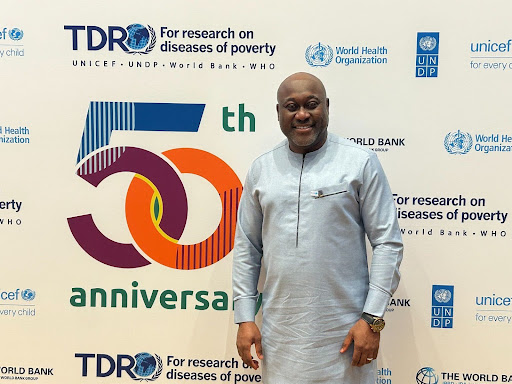In a keynote address at the 50th anniversary of the Special Programme for Research and Training in Tropical Diseases (TDR), Prof. Gordon A. Awandare, Pro Vice-Chancellor in charge of Academic and Student Affairs at the University of Ghana, underscored the vital role of capacity building in bolstering Africa’s health research landscape.
His address, delivered during a commemorative event at the World Health Organization Headquarters in Geneva, Switzerland, spotlighted the intersection of academic rigor, public health imperatives, and sustainable research ecosystems in the African context.
A Strategic Vision for Sustainable Research Ecosystems
Prof. Awandare, who also serves as the Founding Director of the West African Centre for Cell Biology of Infectious Pathogens (WACCBIP), delivered a compelling presentation titled “Building a Sustainable Health Research Ecosystem in Ghana and Across Africa.” He chronicled several projects that have made significant strides in health research on the continent. These projects, he noted, are crucial for both physical and intellectual transformation, aiming to address pressing health challenges through locally-driven research initiatives.
Prof. Awandare emphasized the importance of universities in this transformative process. “Universities are uniquely positioned to integrate education, research, and innovation,” he stated. “By fostering partnerships with industry and government, we can create robust research ecosystems that not only address local health issues but also contribute to global scientific advancements.”
Milestones in Research Capacity Building
Highlighting the achievements of the University of Ghana, Prof. Awandare discussed the establishment of key research centers, including the West African Genetic Medicine Centre (WAGMC), WACCBIP, and the West Africa Centre for Crop Improvement. These centers, supported by significant funding from the World Bank and other international bodies, have become beacons of research excellence in the region.
According to him, WACCBIP, celebrating its 10th anniversary, has received over $53 million from 15 funding agencies, facilitating a world-class research environment and fostering leadership development and mentorship. Prof. Awandare shared his personal journey from a beneficiary of TDR’s research fellowship to becoming an implementer, underscoring the power of sustained capacity-building efforts.
Addressing Systemic Challenges
Despite these successes, Prof. Awandare acknowledged the persistent challenges that African researchers face, including underfunding and brain drain. He pointed out that less than 0.5% of GDP is invested in research across the continent, a figure that pales in comparison to global standards. “To achieve global competitiveness, African universities must position themselves to secure international research funding,” he asserted.
He also called for regional economic bodies like ECOWAS to spearhead collaborative efforts in establishing African-owned credit rating agencies. Such initiatives would ensure that financial assessments are rooted in local realities, potentially saving African countries billions annually and fostering economic stability and growth.
The Future of Health Research in Africa
Looking ahead, Prof. Awandare expressed optimism about the future of health research in Africa. He highlighted the University of Ghana School of Public Health’s (UGSPH) role as a leading implementation research institution, supported by TDR in developing curricula, faculty training, and career development. The UGSPH has trained 486 scholars from 22 countries under the TDR Postgraduate Training Scheme, significantly contributing to the continent’s research capacity.
Prof. Awandare concluded by reiterating the necessity of continuous investment in research capacity building. “Sustaining a culture of research and innovation is essential for addressing the health challenges of today and tomorrow,” he said. “With concerted efforts and strategic partnerships, we can transform Africa’s health research landscape, ensuring better health outcomes for all.”
Prof. Awandare’s address was a clarion call for a renewed focus on building and sustaining research ecosystems that can effectively tackle the health challenges facing Africa. His vision is one where African researchers lead in finding solutions, driving innovation, and contributing to the global body of scientific knowledge.

